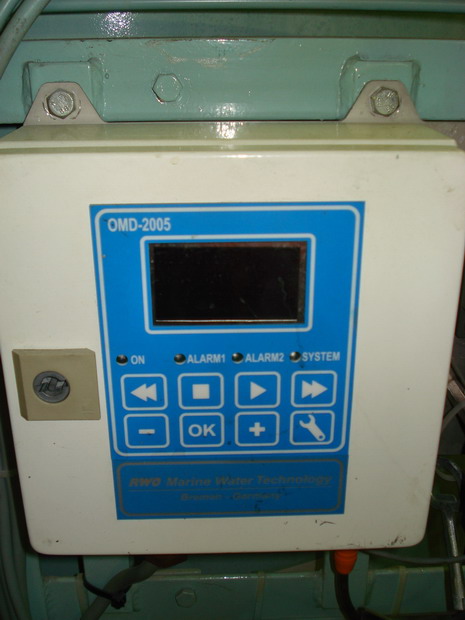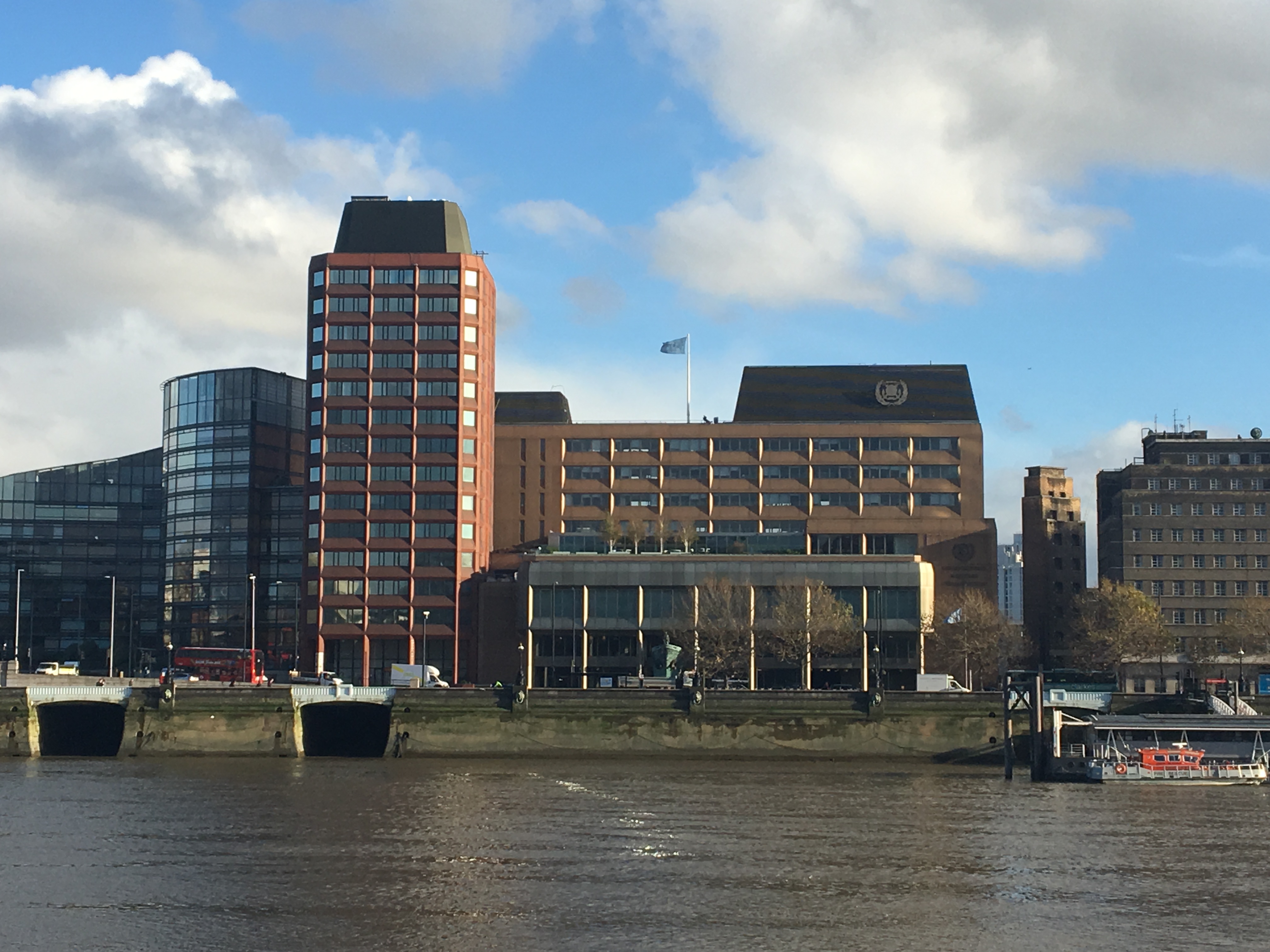|
Oil Record Book
All cargo vessels where MARPOL Convention is applicable must have an oil record book in which the officer responsible will record all oil or sludge transfers and discharges within the vessel. This is necessary for authorities to be able to monitor if a vessel's crew has properly disposed of their oil discharges at sea. Each oil tanker of 150 gross tons and above, ship of 400 gross tons and above other than an oil tanker, and crewed fixed or floating drilling rig or other platform shall maintain an Oil Record Book Part I (Machinery Space Operations). An oil tanker of 150 gross tons and above or a non-oil tanker that carries 200 cubic meters or more of oil in bulk, shall also maintain an Oil Record Book Part II (Cargo/Ballast Operation). Oil record book coding In every entry the chief engineer must record tank number, location, type of oil, description of operation, and quantity. For every operation a combined numerical and letter coding is applied. MEPC.187(59) describes the codes ... [...More Info...] [...Related Items...] OR: [Wikipedia] [Google] [Baidu] |
MARPOL
The International Convention for the Prevention of Pollution from Ships, 1973 as modified by the Protocol of 1978, or "MARPOL 73/78" is one of the most important international marine environmental conventions. MARPOL 73/78, MARPOL is an amalgamation of the words "marine and pollution" in multiple languages and a short way to refer to the purpose of the convention. and 73/78 short for the years 1973 and 1978) It was developed by the International Maritime Organization with an objective to minimize pollution of the oceans and seas, including dumping, oil and air pollution. The original MARPOL was signed on 17 February 1973, but did not come into force at the signing date. The current convention is a combination of 1973 Convention and the 1978 Protocol, which entered into force on 2 October 1983. As of January 2018, 156 states are parties to the convention, being flag states of 99.42% of the world's shipping tonnage. All ships flagged under countries that are signatories to ... [...More Info...] [...Related Items...] OR: [Wikipedia] [Google] [Baidu] |
Marpol Annex I
Marpol Annex I is the first implementation made by Marpol 73/78, one of the most important international marine environmental conventions. The convention was designed to minimize pollution of the seas from ships. The objective of the convention is to preserve the marine environment through the complete elimination of pollution by oil and other harmful substances and the minimization of accidental discharge of such substances. The Marpol Annex I began to be enforced on October 2, 1983, and it details the prevention of pollution by oil and oily water. Marpol Annex I details the discharge requirements for the prevention of pollution by oil and oily materials. It continues to enforce the oil discharge criteria described in the 1969 amendments to the 1954 Oil Pollution Convention. It also introduces the idea ofspecial areas which are considered to be at risk to oil pollution. Discharge of oil within them have been completely outlawed but there are a few minor exceptions. Also in 2003 ... [...More Info...] [...Related Items...] OR: [Wikipedia] [Google] [Baidu] |
Oily Water Separators
An oil is any nonpolar chemical substance that is composed primarily of hydrocarbons and is hydrophobic (does not mix with water) & lipophilic (mixes with other oils). Oils are usually flammable and surface active. Most oils are unsaturated lipids that are liquid at room temperature. The general definition of oil includes classes of chemical compounds that may be otherwise unrelated in structure, properties, and uses. Oils may be animal, vegetable, or petrochemical in origin, and may be volatile or non-volatile. They are used for food (e.g., olive oil), fuel (e.g., heating oil), medical purposes (e.g., mineral oil), lubrication (e.g. motor oil), and the manufacture of many types of paints, plastics, and other materials. Specially prepared oils are used in some religious ceremonies and rituals as purifying agents. Etymology First attested in English 1176, the word ''oil'' comes from Old French ''oile'', from Latin ''oleum'', which in turn comes from the Greek (''elaion'') ... [...More Info...] [...Related Items...] OR: [Wikipedia] [Google] [Baidu] |
Oil Content Meter
An oil content meter (OCM) is an integral part of all oily water separator (OWS) systems. Oil content meters are also sometimes referred to as oil content monitors, bilge alarms, or bilge monitors. OCM technology The OCM continuously monitors how much oil is in the water that is pumped out the discharge line of the OWS system. The OCM will not allow the oil concentration of the exiting water to be above the Marpol standard of 15 ppm. This standard was first adopted in 1977 with Resolution A.393(X) which was published by IMO. These standards were updated various but the most current resolution is MEPC 108(49). The oil content meter will sound an alarm if the liquid leaving the system has an unsatisfactory amount of oil in the mixture. If it is still above that standard, then the bilge water will be reentered into the system until it meets the required criteria. The OCM uses light beams to determine how oily the water in the system is. The system will then gauge the oil conc ... [...More Info...] [...Related Items...] OR: [Wikipedia] [Google] [Baidu] |
Oil Pollution Act Of 1973
The Oil Pollution Act of 1973 or Oil Pollution Act Amendments of 1973, 33 U.S.C. Chapter 20 §§ 1001-1011, was a United States federal law which amended the United States Statute . The Act of Congress sustained the United States commitment to control the discharge of fossil fuel pollutants from nautical vessels and to acknowledge the embargo of coastal zones in trans-boundary waters. The H.R. 5451 legislation was passed by the United States 93rd Congressional session and enacted by the 37th President of the United States Richard Nixon on October 4, 1973. History of OILPOL The International Convention for the Prevention of Pollution of the Sea by Oil (OILPOL) was an international convention organized by the United Kingdom in 1954. The convention was held in London, England from April 26, 1954 to May 12, 1954. The international meeting was convened to recognize the disposal of hazardous waste which could potentially yield toxic contamination to the marine ecosystems. The Intern ... [...More Info...] [...Related Items...] OR: [Wikipedia] [Google] [Baidu] |
Oil Pollution Act Of 1961
Oil Pollution Act of 1961, 33 U.S.C. Chapter 20 §§ 1001-1011, established judicial definitions and coastal prohibitions for the United States maritime industry. The Act invoked the accords of the International Convention for the Prevention of the Pollution of the Sea by Oil, 1954. The international agreement provided provisions to control the discharge of fossil fuel pollutants from nautical vessels on the high seas. The S. 2187 legislation was passed by the United States 87th Congressional session and enacted by the 35th President of the United States John F. Kennedy on August 30, 1961. History The International Convention for the Prevention of Pollution of the Sea by Oil (OILPOL) was an international convention organized by the United Kingdom in 1954. The convention was held in London, England from April 26, 1954 to May 12, 1954. The international meeting was convened to acknowledge the disposal of harmful waste which posed endangerment to the marine ecosystems. The Internat ... [...More Info...] [...Related Items...] OR: [Wikipedia] [Google] [Baidu] |
MARPOL 73/78
The International Convention for the Prevention of Pollution from Ships, 1973 as modified by the Protocol of 1978, or "MARPOL 73/78" is one of the most important international marine environmental conventions. MARPOL 73/78, MARPOL is an amalgamation of the words "marine and pollution" in multiple languages and a short way to refer to the purpose of the convention. and 73/78 short for the years 1973 and 1978) It was developed by the International Maritime Organization with an objective to minimize pollution of the oceans and seas, including dumping, oil and air pollution. The original MARPOL was signed on 17 February 1973, but did not come into force at the signing date. The current convention is a combination of 1973 Convention and the 1978 Protocol, which entered into force on 2 October 1983. As of January 2018, 156 states are parties to the convention, being flag states of 99.42% of the world's shipping tonnage. All ships flagged under countries that are signatories to ... [...More Info...] [...Related Items...] OR: [Wikipedia] [Google] [Baidu] |
Sludge
Sludge is a semi-solid slurry that can be produced from a range of industrial processes, from water treatment, wastewater treatment or on-site sanitation systems. For example, it can be produced as a settled suspension obtained from conventional drinking water treatment, as sewage sludge from wastewater treatment processes or as fecal sludge from pit latrines and septic tanks. The term is also sometimes used as a generic term for solids separated from suspension in a liquid; this 'soupy' material usually contains significant quantities of 'interstitial' water (between the solid particles). Sludge can consist of a variety of particles, such as animal manure. Industrial wastewater treatment plants produce solids that are also referred to as sludge. This can be generated from biological or physical-chemical processes. In the activated sludge process for wastewater treatment, the terms "waste activated sludge" and "return activated sludge" are used. In food processing and bevera ... [...More Info...] [...Related Items...] OR: [Wikipedia] [Google] [Baidu] |
International Convention For The Safety Of Life At Sea
The International Convention for the Safety of Life at Sea (SOLAS) is an international maritime treaty that sets minimum safety standards in the construction, equipment and operation of merchant ships. The International Maritime Organization convention requires signatory flag states to ensure that ships flagged by them comply with at least these standards. The current version of SOLAS is the 1974 version, known as SOLAS 1974, which came into force on 25 May 1980. , SOLAS 1974 has 167 contracting states, which flag about 99% of merchant ships around the world in terms of gross tonnage. SOLAS in its successive forms is generally regarded as the most important of all international treaties concerning the safety of merchant ships. Signatories The non-parties to SOLAS 1974 include numerous landlocked countries (for obvious reasons), as well as El Salvador, Micronesia and East Timor. Some others including Bolivia, Lebanon and Sri Lanka, all considered flag of convenience states, a ... [...More Info...] [...Related Items...] OR: [Wikipedia] [Google] [Baidu] |
International Maritime Organization
The International Maritime Organization (IMO, French: ''Organisation maritime internationale'') is a specialised agency of the United Nations responsible for regulating shipping. The IMO was established following agreement at a UN conference held in Geneva in 1948 and the IMO came into existence ten years later, meeting for the first time in 1959. Headquartered in London, United Kingdom, IMO currently has 175 Member States and three Associate Members. The IMO's primary purpose is to develop and maintain a comprehensive regulatory framework for shipping and its remit today includes maritime safety, environmental concerns, legal matters, technical co-operation, maritime security and the efficiency of shipping. IMO is governed by an assembly of members which meets every two years. Its finance and organization is administered by a council of 40 members elected from the assembly. The work of IMO is conducted through five committees and these are supported by technical subcommitte ... [...More Info...] [...Related Items...] OR: [Wikipedia] [Google] [Baidu] |



